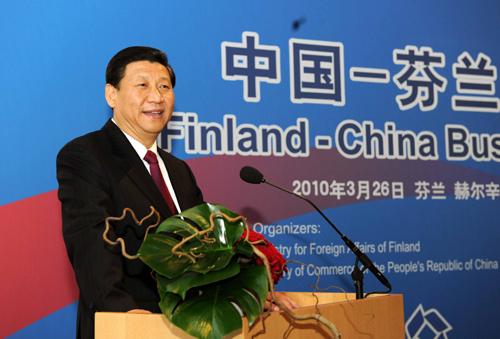Chinese President Xi Jinping to pay state visit to Finland
china.org.cn / chinagate.cn by Mikko Teng, April 5, 2017 Adjust font size:
|
|
|
Xi Jinping, then Chinese vice president, addresses the Finland-China Business Dinner Reception in Helsinki, Finland, March 26, 2010. [File photo] |
The Chinese Foreign Ministry has announced that President Xi Jinping and his wife Peng Liyuan will pay a state visit to Finland between April 4-6.
This is the second time a Chinese head of state has visited Finland (the previous one being by President Jiang Zemin some 20 years ago), and is designed to highlight 67 years of friendly diplomatic relations and also to celebrate the 100th anniversary of independence for the small Nordic country this year.
The Chinese-Finnish relationship is a perfect example of how two nations so different in size, culture and political system can complement each other based on mutual economic and business interests.
In 1950, Finland was one of the first Western countries to establish diplomatic relations with the People's Republic of China, and also the first capitalist country to sign a trade deal in 1953.
Finland's moves, which also included staunch support for China's gaining membership in the United Nations, created much goodwill in China, and resulted in active cultural exchanges beginning as early as the 1950s.
Finland and China have had an agreement on economic, industrial, scientific and technological cooperation since 1973, it last being revised in 2005. Since the early 1990s, there has been at least one official ministerial-level visit from Finland to China each year.
Today there are all kinds of contacts and exchanges, especially when it comes to work and education: around 8,000 Chinese people living in Finland, less the other way round, with an emphasis on study.
For Finland, cooperation is focused on trade and business. China is its biggest trading partner in Asia and the fifth biggest overall, and currently some 400 Finnish companies do business in China, such as the elevator giant Kone, paper industry leaders StoreEnso and UPM, and not forgetting Nokia Networks, even though the former biggest foreign investor in China, Nokia Mobile Phones, has gone.
Finnish investments in China amount to €10 billion, employing some 60,000 people. Furthermore, projects and programs to promote Finnish companies and solutions in clean technology, food safety, tourism, education, health and welfare services, design, rule of law, etc., in China, have been in place in recent years, hopefully resulting in both business opportunities and closer bilateral cooperation in the long run.
Finland is also active in participating in Chinese-led international initiatives such as becoming a founding member of the Asian Infrastructure Investment Bank (AIIB) in 2015 and looking forward to cooperation in the Belt and Road Initiative being promoted by the Chinese government.
From a Chinese perspective, mutual benefit and respect have been the foundation of the relationship. The past 67 years have been of great importance to the two countries. In this period, China and Finland experienced a significant change from being poor and weak to the rich and strong.
The good relations have certainly served their development. Today, facing a changing world, both the countries are bravely ambitious to increase their competitiveness to meet new challenges in globalization. On the basis of past successful cooperation, China and Finland should enhance joint efforts to open a new chapter for greater future relations.
In a speech offered by Chinese Ambassador Huang Xing several years ago, she specifically outlined a few points:
First, deepening China-Finland relationship from the strategic heights. A multi-polar world increases both interdependence and mutual demands. The two nations need to plan and treat bilateral ties from a long-term viewpoint; need to keep high-level contacts, learn more from each other, be more inclusive and strengthen common ground so as to highlight China-Finland cooperation as the model for China-Europe ties as well as international relations in general.
Second, widen economic and trade cooperation. The mainstream of a future world is to strive to build a green economy with high-tech as the core. The two nations' economies are complementary in many fields helping promote bilateral investment and trade, and increase technological exchanges and cooperation in telecommunications, resources, energy saving and the environment to foster new industries.
Third, strive to create highlights in cultural and people-to-people exchanges. In recent years, Finnish leaders, entrepreneurs and tourists have visited China for such events as the Beijing Olympics, Shanghai Expo as well as for holidays. And there have been more active student exchange programs between the schools and universities of the two countries. Much bigger numbers of Chinese are now visiting Finland each year.
President Xi's visit will enable him to have wide-ranging discussions with his Finnish counterpart, particularly in the areas previously outlined. A series of bilateral documents and agreements are expected to be signed to strengthen the Finnish-Chinese relationships and ensure better, mutually-beneficial cooperation.
The author is a Finn originally born in Beijing, China. Graduated from University of Helsniki, he is a lecturer in Social sciences and cultural studies at Beijing International Studies University and Beijing Capital University of Business and Economics.
